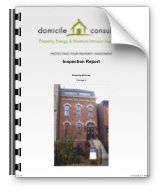So you found the perfect home and your offer has been accepted. Congratulations…..now it’s crunch time. In the typical Chicago real estate transaction you, as the buyer, have 5 days during which your attorney will review your contract and your inspector will evaluate the condition of the property. In a competitive and active market, you don’t have much time to waste. You’ve gotten referrals from your realtor, closing attorney, lender, Yelp, Angie’s List, neighbors, friends and co-workers, and you’ve found just the inspector for the job….you hope. You set the appointment and the inspector sends you the Inspection Agreement. Reading through the agreement, or contract for services, you may be struck by the apparently one-sided nature of the risk placement…it’s all on you!
Too often, all of the risk in a real estate transaction falls to the buyer
In Illinois, the courts have upheld the Limits of Liability clause that most every inspector has in his/her Inspection Agreement. This means that, in most instances, your inspector’s liability for errors and omissions is limited to the fee that you were charged. Your average consumer may be shocked at the lop-sided nature of this dynamic; I know that I was when I first heard about it. Now, any attorneys in the audience are more than welcome to weigh in with their opinion and this blog post is NOT intended as legal advice.
Imagine that you’ve put years of effort into saving for your down payment, months of effort into finding the right home, and weeks of effort at negotiating the best deal. You need to know exactly what the condition of the home is before you sign that last document at your closing and you come to find that your home inspector is pretty much bullet-proof against your claims if he/she does a crappy job. It just doesn’t seem right, does it? Even though I’m a home inspector, and even I can clearly see the potential for abuse and unfairness that this situation presents.
How the home inspection process is supposed to work
The dynamic of the inspector/buyer transaction was explained to me by my mentor many years ago like this: When a client calls to book an inspection they are looking to put the huge risk they feel regarding that purchase onto (at least in part) their home inspector by tasking him/her with discovering the flaws in the home. When the home inspector performs a thorough inspection and writes a detailed report they are placing that risk back on the client/buyer. The report should detail the following in regard to the issues and conditions in the home:
- a) What’s wrong,
- b) why it’s wrong, and
- c) what should be done to correct it.
Another way to put it is that the report should describe Defect, Ramification, and Resolution.
Our company, Domicile Consulting LLC, was named in a lawsuit a few months ago after a sliding patio door in a newly constructed home we had inspected fell out of it’s track onto the homeowner who was operating it. Apparently, the painters had taken it out of the track after our inspection and perhaps had not set it back into place. I believe we were lumped into the lawsuit in an attempt to cast a broad net of culpability over anyone with insurance coverage who was remotely connected to the incident.
Our insurance broker, Elite MGA, and our policy provider, The Hanover Insurance Group, went to work. They found us local counsel and set out to have the plaintiff’s claims dismissed due to the Limit of Liability clause. The judge held in our favor and we were dismissed from the suit which, as you may imagine, was quite a relief. In nearly 20 years of inspecting homes and with over 10,000 inspections performed, our company had never before been named in a lawsuit. The incredible lightness of being released from what I feel was a frivolous lawsuit was dampened by two things; first, we had to pay the $2500 deductible and refund the $495 inspection fee and secondly, I realize that there are consumers who have been very poorly served by their inspectors and whose access to redress is limited (in Illinois at least) to a sum that is quite paltry relative to the cost of a serious inspection omission such as a worn out roof, structural flaws, etc.
This lack of consumer protection for home buyers in Illinois, compared to say California, caused a client of mine who relocated to Chicago from The Golden State to schedule back-to-back inspections on consecutive days in order to manage his purchase risk. How then, short of paying for two inspections, can a typical home buyer reduce their risk in the Illinois real estate purchase arena? To us at Domicile Consulting LLC, the answer is obvious.
The importance of the home inspection report—it’s ultimately what you’re paying for
Take some time to get multiple inspector referral sources. Don’t rely solely on your real estate agent’s recommendation—realtors can have ulterior motives. Do your own homework on some of the consumer review sites; ask your colleagues, friends and neighbors who have recently purchased homes; and most of all READ THEIR REPORTS!
Don’t forget that the ‘product’ you are purchasing is a home inspection report: that is the document that will get you a reduction in sales price, get you a cash credit at closing, get the sellers to make some repairs, or just get you a road map that will guide you from where your home is at currently to where that same home is as safe, comfortable, efficient, and durable as possible. Any truly professional inspector will use digital photos and a digital report software and that inspector should have sample reports readily available to help you make the best choice.
As has been said, “decisions made in haste are often repented at leisure.” Take your time, do your homework, and find an inspector who will “Look Closer, Think Further.”

